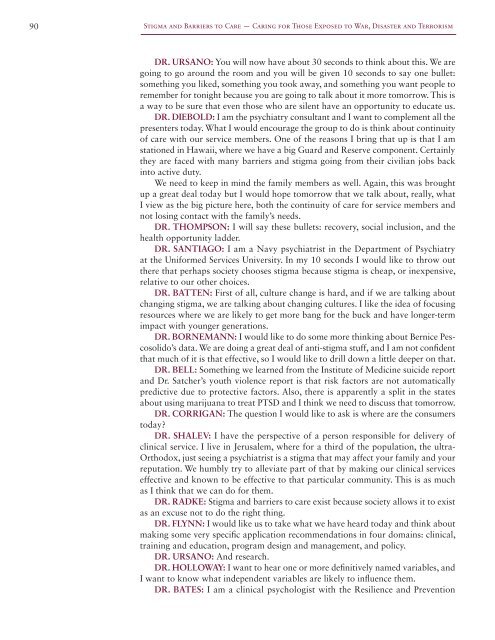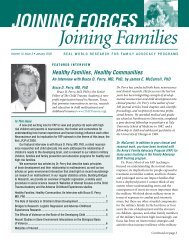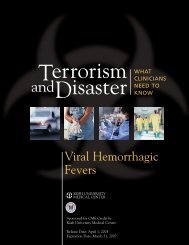stigma and barriers to care - Uniformed Services University of the ...
stigma and barriers to care - Uniformed Services University of the ...
stigma and barriers to care - Uniformed Services University of the ...
Create successful ePaper yourself
Turn your PDF publications into a flip-book with our unique Google optimized e-Paper software.
90<br />
Stigma <strong>and</strong> Barriers <strong>to</strong> Care — Caring for Those Exposed <strong>to</strong> War, Disaster <strong>and</strong> Terrorism<br />
DR. URSANO: You will now have about 30 seconds <strong>to</strong> think about this. We are<br />
going <strong>to</strong> go around <strong>the</strong> room <strong>and</strong> you will be given 10 seconds <strong>to</strong> say one bullet:<br />
something you liked, something you <strong>to</strong>ok away, <strong>and</strong> something you want people <strong>to</strong><br />
remember for <strong>to</strong>night because you are going <strong>to</strong> talk about it more <strong>to</strong>morrow. This is<br />
a way <strong>to</strong> be sure that even those who are silent have an opportunity <strong>to</strong> educate us.<br />
DR. DIEBOLD: I am <strong>the</strong> psychiatry consultant <strong>and</strong> I want <strong>to</strong> complement all <strong>the</strong><br />
presenters <strong>to</strong>day. What I would encourage <strong>the</strong> group <strong>to</strong> do is think about continuity<br />
<strong>of</strong> <strong>care</strong> with our service members. One <strong>of</strong> <strong>the</strong> reasons I bring that up is that I am<br />
stationed in Hawaii, where we have a big Guard <strong>and</strong> Reserve component. Certainly<br />
<strong>the</strong>y are faced with many <strong>barriers</strong> <strong>and</strong> <strong>stigma</strong> going from <strong>the</strong>ir civilian jobs back<br />
in<strong>to</strong> active duty.<br />
We need <strong>to</strong> keep in mind <strong>the</strong> family members as well. Again, this was brought<br />
up a great deal <strong>to</strong>day but I would hope <strong>to</strong>morrow that we talk about, really, what<br />
I view as <strong>the</strong> big picture here, both <strong>the</strong> continuity <strong>of</strong> <strong>care</strong> for service members <strong>and</strong><br />
not losing contact with <strong>the</strong> family’s needs.<br />
DR. THOMPSON: I will say <strong>the</strong>se bullets: recovery, social inclusion, <strong>and</strong> <strong>the</strong><br />
health opportunity ladder.<br />
DR. SANTIAGO: I am a Navy psychiatrist in <strong>the</strong> Department <strong>of</strong> Psychiatry<br />
at <strong>the</strong> <strong>Uniformed</strong> <strong>Services</strong> <strong>University</strong>. In my 10 seconds I would like <strong>to</strong> throw out<br />
<strong>the</strong>re that perhaps society chooses <strong>stigma</strong> because <strong>stigma</strong> is cheap, or inexpensive,<br />
relative <strong>to</strong> our o<strong>the</strong>r choices.<br />
DR. BATTEN: First <strong>of</strong> all, culture change is hard, <strong>and</strong> if we are talking about<br />
changing <strong>stigma</strong>, we are talking about changing cultures. I like <strong>the</strong> idea <strong>of</strong> focusing<br />
resources where we are likely <strong>to</strong> get more bang for <strong>the</strong> buck <strong>and</strong> have longer-term<br />
impact with younger generations.<br />
DR. BORNEMANN: I would like <strong>to</strong> do some more thinking about Bernice Pescosolido’s<br />
data. We are doing a great deal <strong>of</strong> anti-<strong>stigma</strong> stuff, <strong>and</strong> I am not confident<br />
that much <strong>of</strong> it is that effective, so I would like <strong>to</strong> drill down a little deeper on that.<br />
DR. BELL: Something we learned from <strong>the</strong> Institute <strong>of</strong> Medicine suicide report<br />
<strong>and</strong> Dr. Satcher’s youth violence report is that risk fac<strong>to</strong>rs are not au<strong>to</strong>matically<br />
predictive due <strong>to</strong> protective fac<strong>to</strong>rs. Also, <strong>the</strong>re is apparently a split in <strong>the</strong> states<br />
about using marijuana <strong>to</strong> treat PTSD <strong>and</strong> I think we need <strong>to</strong> discuss that <strong>to</strong>morrow.<br />
DR. CORRIGAN: The question I would like <strong>to</strong> ask is where are <strong>the</strong> consumers<br />
<strong>to</strong>day<br />
DR. SHALEV: I have <strong>the</strong> perspective <strong>of</strong> a person responsible for delivery <strong>of</strong><br />
clinical service. I live in Jerusalem, where for a third <strong>of</strong> <strong>the</strong> population, <strong>the</strong> ultra-<br />
Orthodox, just seeing a psychiatrist is a <strong>stigma</strong> that may affect your family <strong>and</strong> your<br />
reputation. We humbly try <strong>to</strong> alleviate part <strong>of</strong> that by making our clinical services<br />
effective <strong>and</strong> known <strong>to</strong> be effective <strong>to</strong> that particular community. This is as much<br />
as I think that we can do for <strong>the</strong>m.<br />
DR. RADKE: Stigma <strong>and</strong> <strong>barriers</strong> <strong>to</strong> <strong>care</strong> exist because society allows it <strong>to</strong> exist<br />
as an excuse not <strong>to</strong> do <strong>the</strong> right thing.<br />
DR. FLYNN: I would like us <strong>to</strong> take what we have heard <strong>to</strong>day <strong>and</strong> think about<br />
making some very specific application recommendations in four domains: clinical,<br />
training <strong>and</strong> education, program design <strong>and</strong> management, <strong>and</strong> policy.<br />
DR. URSANO: And research.<br />
DR. HOLLOWAY: I want <strong>to</strong> hear one or more definitively named variables, <strong>and</strong><br />
I want <strong>to</strong> know what independent variables are likely <strong>to</strong> influence <strong>the</strong>m.<br />
DR. BATES: I am a clinical psychologist with <strong>the</strong> Resilience <strong>and</strong> Prevention




